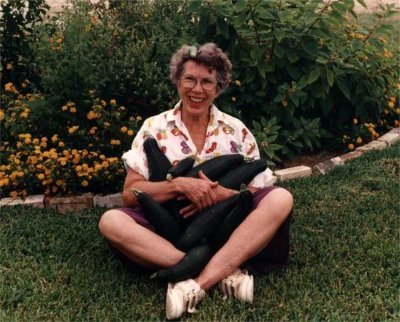
At age 70, Julia poses with part of her garden's morning harvest in the summer of 1993.
Our thanks to Julia for this interesting addition concerning what it takes to start a small garden that may provide almost all one's salad needs and more! As her oldest son, who saw many a garden she started as I was growing up or later, I can attest to her excellently green thumb, nurtured and refined as it was by over eight decades of experience. Larry)
If you have a mostly sunny spot in your backyard then you can start building a place for a garden. Watch for bags of grass clippings and leaves on your way to and from work, or in your neighborhood. Pick them up, and then pour them onto your designated spot. If you can get some chicken or cow manure, put that on also. It would be easier if you put a twelve-inch high barrier around the garden-to-be. That way, you will keep the place contained and know when you have enough. If you begin with mowing time this spring, by next spring you can rake away anything which hasn't decomposed and will find at least three inches of good soil. Most veggies do not need more. For something like tomatoes, you would need to dig a hole about eight inches deep, put a good compost in the bottom of the hole, and plant the tomato about four inches deep. Their roots should spread down and out. For all the veggies you would likely have time to keep watered and harvested, a plot of 10 by 10 feet would be about right.
 At age 70, Julia poses with part of her garden's morning harvest in the summer of 1993. |
My second son had a technique for gardening in VA. He chose an area for his garden and, taking a shovel, he would dig a hole each time he had vegetable scraps and buried them about ten inches deep, then left the shovel sticking up in the ground to mark the spot for the next hole. For awhile recently, I was whirring up my scraps mixed with water in the blender, then having my grandson who lives with me bury them. However, when it turned cold I stopped bothering to do that. Ideally you will have your twelve inches of scraps, grass clippings, manure, and leaves in place before it gets to be winter. Then you can just let it compost until spring.
The important thing to remember is to find out what seeds to plant and when in your area. Timing is very important and knowing the plants which will do well in your locale. For instance, tomatoes won't do well until the night time temperature reaches at least 60°F, but are better at 65°. By that time, in TX the days are rapidly getting almost too warm. So, since in central TX tomatoes won't produce when the day temperature is over 90°, timing is of the essence. I have found that Improved Porter is the one variety which will hold on well and put out a fresh crop in the waning days of summer. They do not produce a large tomato, but the big varieties are not the best for Waco. With them, even if your soil has been amended well, you might get just few of the large tomatoes, but the production won't last long.
No matter what you have in your garden, it does take constant surveillance. Everyday, you need to look the plants over for hornworms, squash beetles, and other pests too numerous to mention. I hate using insecticides and so try other ways of getting control. The hornworms can be picked off the plants, but it is necessary to watch every day. Just one worm can eat its way through a plant over a twenty-four hour period. I recently heard a remedy for squash beetles, but I don't remember it now. However, if I had some squash plants in my garden, I would see whether Google could tell me what to do. If you see one tomato hornworm that may be all, at least for that day. However, squash beetles seem to be there in droves and can take a plant from looking great to dying within a couple of days.
Back when I had a large garden, I did not have a full-time job, and I never did watch much daytime TV. Gardening takes about two hours per day at the beginning of the season, maybe more on a weekend or two while preparing the soil. However, then there are veggies to pick and prepare, bug watches every day, and at times watering has to be done. Most people nowadays would rather buy frozen vegetables or from the fresh bins at the supermarket, and some will even go to a farmers market. Gardening is an excellent way to get exercise, and it is healthy to be outdoors while getting some, but not too much, sun. I have felt that at my age my body was not up to it. However, the cost of everything keeps rising and my stocks keep lowering, so I have taken out all the flowers along the back and intend to plant things I can eat. My soil is abysmally bad, but perhaps I can coax a tiny crop.
Ordinarily I never get enough sleep, but after working in the yard for an hour and a half this past Sunday, I slept eight hours. I guess the effect did not wear off last night either since even then I slept seven hours. All in all, gardening is enjoyable and good for you when you are doing it, then pays great long-term dividends in fresh produce, stimulated muscles, better rest, Vitamin D, and a healthy, high fiber diet. One is even helping the environment, by not using foods that it takes a big carbon footprint to produce. What could be better?